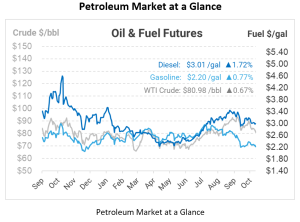
Best Practices for Fueling up Backup Power Generators
Reliability is an absolute requirement when dealing with backup power generators, regardless of whether you manage a modest enterprise or a massive data center. The dependable performance of your generator is crucial, and any hiccups in its operation can have severe consequences for your operations.
In today’s article, we will explore three best practices for fueling up backup power generators that will maximize your generator’s operational success, even during unforeseen emergencies.
Fuel Supply
Disasters, like large-scale power outages, earthquakes, or hurricanes, put power systems to the test while also causing wide-spread fuel shortages. Increased demand from various facilities relying on backup generators and just-in-time inventory logistics further complicates the situation. That’s why it’s crucial to establish a reliable fuel supply program that can consistently provide fuel throughout the year.
The foundation of a robust program is understanding your maximum runtime at full power. It’s crucial to determine how many gallons per hour your generators consume when operating at full capacity. For instance, consider a data center with 200 generators, each equipped with 6,000-gallon belly tanks. In a worst-case scenario, if all generators were running at full power, they could burn up to 54,000 gallons per hour. Is your fuel supplier ready to deliver the fuel you need?
Fuel Quality
Fuel quality is another critical aspect of a successful backup power generator program. Ensuring that your fuel is free from contaminants and spoilage is imperative.
Diesel fuel is a complex mixture of components that can separate, leading to water accumulation and microbial growth. Sediment, corrosion, and incomplete combustion can also impact fuel quality. Regular fuel testing and remediation are necessary to address fuel quality issues. Fuel samples should be visually inspected and sent to a lab for testing. Remediation can involve tank cleaning, polishing, and additives to address water, contaminants, and deterioration.
Preventive Maintenance
In addition to fuel quality management, preventative maintenance is crucial. Regular generator maintenance, monitoring of fuel levels, and testing during seasonal changes are essential components of an ongoing servicing program.
This proactive approach involves a series of planned activities and procedures aimed at preventing potential issues, addressing wear and tear, and optimizing the overall performance of the generator system.
Monitoring fuel levels is another important aspect and involves keeping a close eye on the fuel supply within the generator’s tank. Regular checks and replenishment of fuel, especially during seasonal changes or fluctuations in demand, ensure that the generator has an adequate fuel reserve to function optimally during power outages.
By addressing these factors, you can ensure that your backup power generator operates seamlessly during emergencies, providing continuity for your critical operations. Remember, planning and preparation are the keys to a no-fail fueling program, and they should be a top priority for any facility that relies on backup power generation.
Looking for a dependable fuel supplier?
Mansfield Energy provides reliable fuel supply across North America at competitive, market-based prices. For refined fuels, including diesel, gasoline, biofuels, and kerosene, we make sure you always have the fuel when and where you need it. Mansfield holds over 300 refinery contracts nationwide with more than 900 fuel terminal supply points.
Contact us to schedule a call with a Mansfield Energy professional.

This article is part of Daily Market News & Insights
Tagged: back up power, emergency response, generators
MARKET CONDITION REPORT - DISCLAIMER
The information contained herein is derived from sources believed to be reliable; however, this information is not guaranteed as to its accuracy or completeness. Furthermore, no responsibility is assumed for use of this material and no express or implied warranties or guarantees are made. This material and any view or comment expressed herein are provided for informational purposes only and should not be construed in any way as an inducement or recommendation to buy or sell products, commodity futures or options contracts.





